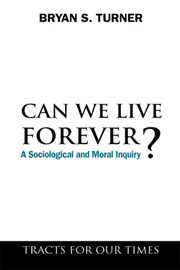Book contents
- Frontmatter
- Contents
- Acknowledgements
- Can We Live Forever?
- Chapter One Longevity and the Population Debate
- Chapter Two The Social Utopia of Human Perfection
- Chapter Three Ancient and Modern Techniques of Longevity
- Chapter Four The Political Economy of Ageing
- Chapter Five The Moral and Spiritual Character of Old Age
- Chapter Six Vulnerability and the Ethic of Care
- Chapter Seven Towards a New Paradigm of Ageing
- Chapter Eight The Aesthetics of Ageing
- Bibliography
- Index
Chapter One - Longevity and the Population Debate
Published online by Cambridge University Press: 05 March 2012
- Frontmatter
- Contents
- Acknowledgements
- Can We Live Forever?
- Chapter One Longevity and the Population Debate
- Chapter Two The Social Utopia of Human Perfection
- Chapter Three Ancient and Modern Techniques of Longevity
- Chapter Four The Political Economy of Ageing
- Chapter Five The Moral and Spiritual Character of Old Age
- Chapter Six Vulnerability and the Ethic of Care
- Chapter Seven Towards a New Paradigm of Ageing
- Chapter Eight The Aesthetics of Ageing
- Bibliography
- Index
Summary
Introduction: Living or Surviving?
The quest for longevity appears to have been a recurrent theme in the history of human societies, because the possibility of extending life has persistently disturbed and provoked human consciousness. Awareness of our own finitude is a defining characteristic of what it is to be human and provides much of the foundation of religion, art and morality. In both fact and fiction, humans have long been pondering questions about longevity and happiness. Shakespeare's King Lear, in which the elderly king begins somewhat hastily and naively to surrender his sovereign powers to his daughters, may be a lesson about how not to become socially and politically irrelevant. At King Lear's court, the Fool warns the King not to grow old until he has grown wise. Similarly Jonathan Swift's Gulliver's Travels, in 1726, offered a humorous if also satirical and bitter account of the disillusion and depression suffered by the Immortals of the Kingdom of Luggnagg who were condemned to live forever. They have no memories of their youth and no hopes of any future release from the treadmill of life, thereby living their lives in a state of envy and moroseness. After his initial enthusiasm for the immortal Luggnaggians, Gulliver is informed that ‘Envy and impotent Desires are their prevailing Passions’ (Swift 2003, 196). Longevity had not trained them in superior virtues, but merely added to the existing list of mortal vices, and hence their immortality was farcical and pathetic.
- Type
- Chapter
- Information
- Can We Live Forever?A Sociological and Moral Inquiry, pp. 1 - 26Publisher: Anthem PressPrint publication year: 2009



